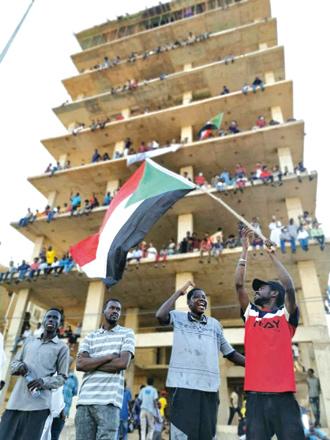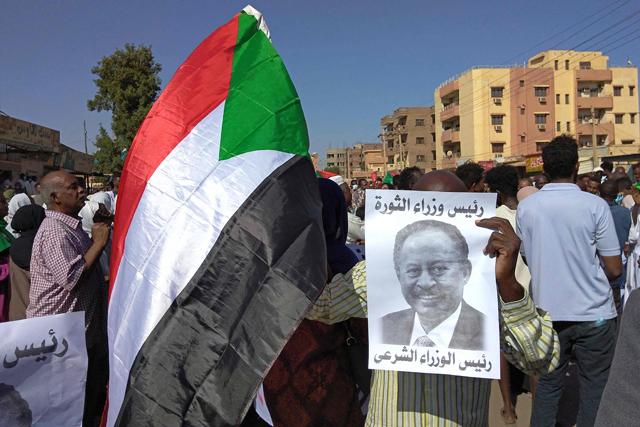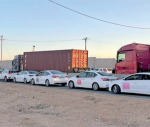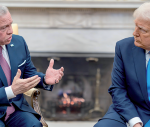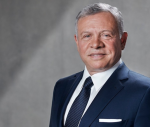You are here
Sudan police fires tear gas as thousands rally for revolt anniversary
By AFP - Dec 20,2021 - Last updated at Dec 20,2021
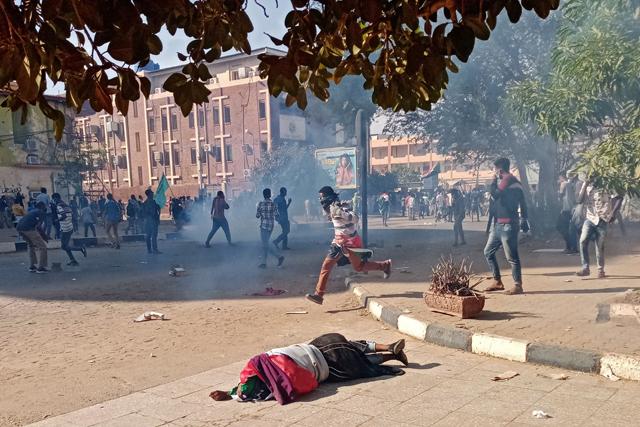
A wounded Sudanese protester falls on the pavement after security forces fired tear gas during a rally to mark three years since the start of mass demonstrations that led to the ouster of strongman Omar Al Bashir, in the capital Khartoum, on Sunday (AFP photo)
KHARTOUM — Tens of thousands of Sudanese protesters rallied Sunday to mark three years since the start of mass demonstrations that led to the ouster of Omar Al Bashir, as fears mount for the democratic transition.
Security forces fired tear gas at a huge crowd of protesters near the republican palace in the capital Khartoum, chanting slogans against the current military chief, General Abdel Fattah Al Burhan, who led a coup on October 25.
"The people want the downfall of Burhan", protesters shouted.
The generals had initially detained civilian leader Prime Minister Abdalla Hamdok for weeks under effective house arrest, but reinstated him on November 21.
But the move alienated many of Hamdok's pro-democracy supporters, who dismissed it as providing a cloak of legitimacy for Burhan's coup.
Hamdok, who has argued he wants to avoid further bloodshed, warned late Saturday of "the country's slide toward the abyss", urging restraint from the protesters.
"We're facing today a sizeable regression in the path of our revolution that threatens the security of the nation, its unity and its stability," Hamdok said.
Protest organisers have however vowed, in a key slogan, "No negotiation, no partnership and no legitimacy".
Previous protests against the military takeover have been forcibly dispersed by the security forces.
Nationwide, at least 45 people have been killed and scores more wounded, according to the independent Doctors' Committee.
On Sunday, authorities shut off bridges linking the capital Khartoum with its twin city Omdurman, but large crowds still gathered.
“The numbers are huge and security forces can’t control them,” said Mohamed Hamed, who saw the protests in Omdurman.
Military in ‘complete control’
December 19 has a particular resonance in Sudanese history.
Not only was it the day in 2018 when thousands launched mass protests that ended Bashir’s three decades in power, it was also the day in 1955 when Sudanese lawmakers declared independence from British colonial rule.
Following Bashir’s ouster, a joint military-civilian transitional government took power but the troubled alliance was shattered by Burhan’s power grab.
“The coup has put obstacles in the way of the democratic transition and has given the military complete control over politics and the economy,” Ashraf Abdel-Aziz, chief editor of the independent Al Jarida newspaper, told AFP.
Sudan’s military dominates lucrative companies specialising in everything from agriculture to infrastructure projects.
The prime minister said last year that 80 per cent of the state’s resources were “outside the finance ministry’s control”.
“The security apparatus has won out over political institutions. The success of a democratic transition rests on political action being the driving force,” Abdel-Aziz said.
Khaled Omer, a minister in the ousted government, said the coup was a “catastrophe” but also “an opportunity to rectify the deficiencies” of the previous political arrangement with the army.
He warned that anything could happen over the next few months with the military still firmly in power.
“If the main political actors don’t get their act together and the miliary establishment doesn’t distance itself from politics... then all scenarios are on the table,” Omer said.
Gains unravelling
The November 21 agreement also set July 2023 as the date for Sudan’s first free elections since 1986.
Hamdok said he partnered with the military to “stop the bloodshed” that resulted from its crackdown on protests, and so as not to “squander the gains of the last two years”.
But those achievements have been unravelling, as the political turbulence in Khartoum rekindles conflicts in Sudan’s far-flung regions that Hamdok’s government had made a priority to resolve.
A peace deal signed with key rebel groups last year saw the main conflict in Darfur subside, but the region remains awash with weapons and nearly 250 people have been killed in ethnic clashes over the past two months.
Some of the Arab militias — that Bashir’s government used as a counterinsurgency force in its infamous campaign in the early 2000s against ethnic minority rebels — have been integrated into the security apparatus.
Critics say the deal did nothing to bring them to account.
Related Articles
KHARTOUM — Sudanese anti-coup protesters on Sunday manned barricades in Khartoum a day after a deadly crackdown on mass rallies, as a defian
KHARTOUM — The first US ambassador to Sudan in 25 years took up his post on Wednesday in the latest easing of ties since Washington removed
KHARTOUM — Sudan's top military leader and the prime minister he ousted almost a month ago have reached a deal for the premier's return to g


